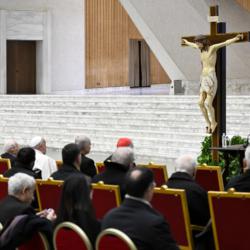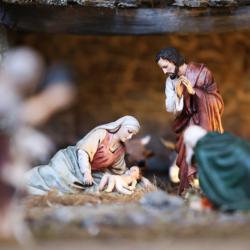Going without
Fasting is everywhere, and it's trending. Intermittent fasting has become the single most popular approach to a healthy diet. Somehow, eating for only eight hours each day is making a difference for people who have struggled to lose weight or lower their glucose and cholesterol numbers.
But if the secular world has embraced fasting as a way to reach health goals, it seems many Catholics and other Christians have lost touch with what fasting can do in our spiritual lives. In fact, we've grown a bit confused not only about why we should regularly incorporate fasting into the practice of our faith but also about what exactly fasting is -- and isn't.
Christian fasting doesn't mean giving up something sinful. And it isn't done to perfect the body. Salvation means leaving sin behind. And, whatever health benefits we might receive, the purpose of our fasting cannot be merely physical. That's not to say that our bodies don't matter; they do. But they are intended to be servants of our souls and not masters. Fasting helps us get there.
When we choose to go without something our bodies want, we are reining in the power our appetites and desires have over us. We are turning away from the notion that we are entitled to have everything we want. And when we take that one step further and judiciously choose to abstain from something our bodies need for a brief period of time, we are placing our physical nature under the authority of our spiritual nature. We are ordering ourselves properly.
And here's what's important about being properly ordered: disorder interferes with our ability to align ourselves with God. That's especially true when it comes to doing God's will instead of our own. When we link our happiness to our appetites, we live in a way that is self-serving -- even though we may not intend to do so. Allowing God a free hand in our lives means that we depend on him for everything: not only what we need, but also what we desire. Fasting brings us to the threshold of that reality.
Does God care if I eat a hotdog or a grilled cheese sandwich on Fridays? That's asking the wrong question. But there are plenty of better ones. Does God care whether I am capable of going without something in order to attain something even better? Does God care about whether I am able or willing to put something I want aside in order to receive what he wants to give me? Does God care about whether I am prepared to make sacrifices for others and not just for myself? The answer to all of those questions is a resounding yes. God does care about all these things because he cares about (and for) us.
Our needs and wants don't have to propel us toward radical self-sufficiency; they can inspire us to trust in God instead. Our heavenly Father wants us to come to him with our needs as well as our hearts' desires, even though he already knows them all. I like to think of fasting as adding weight to our prayers. We can certainly ask God to help us, change us, forgive us, and bless us. But when we fast along with our prayer, we are showing him that we are willing to place him -- and not just what he can do for us -- above everything else. We are living in a spirit of sacrifice that enables us not just to seek God but to seek him first.
The Church calls us to fast, not only during Lent but in some measure all year long. And that's because most of us need to be reminded of the link between discipleship and discipline. Fasting is one of the best ways to align ourselves with God's will and grow in holiness. Saying no to ourselves doesn't change everything all at once -- but over time, it expands our capacity for unselfish and sacrificial love.
- Jaymie Stuart Wolfe is a Catholic convert, wife, and mother of eight. Inspired by the spirituality of St. Francis de Sales, she is an author, speaker, and musician, and provides freelance editorial services to numerous publishers and authors as the principal of One More Basket. Find Jaymie on Facebook or follow her on Twitter @YouFeedThem.


















